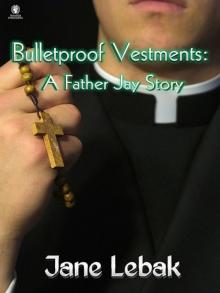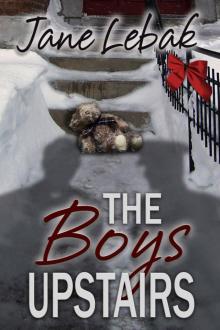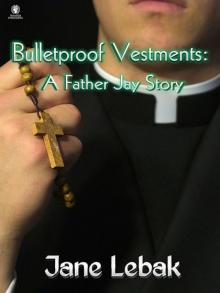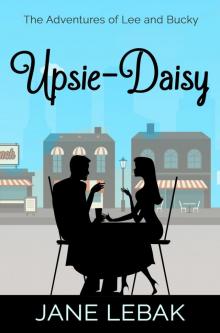- Home
- Jane Lebak
The Boys Upstairs (Father Jay Book 2) Page 5
The Boys Upstairs (Father Jay Book 2) Read online
Page 5
Kevin found himself caught up in the preparations. When the first people arrived, Jay left the kitchen and collared four of the young men. He showed Kevin how much rice and beans to put on each of the plates, and then he finished off each meal with a helping of salad and a thick slice of Italian bread. The four “waiters” took the full plates from the kitchen along with cups of orange or apple juice.
During a pause, Kevin said, “Why don't they just come to us?”
“Too much stigma, like a school lunchroom.” Jay worked without sparing a moment to look at Kevin. “The younger ones like playing waiter, and that keeps everyone's dignity intact. It's important.”
They said nothing else to one another during the initial lunch crush, and when the flow of people ended, Jay fixed plates for Kevin and himself. They made their way into the lunchroom where more than forty men, women and children were having their meals.
Before they found a pair of seats, Maria came flying up to Jay, screeching, with Louis at her heels.
“Woah!” He lifted his tray away from the pair as Maria ducked behind his legs, smacked Louis's arm, and then took cover again at his back. “What's going on?”
“He took my roll!” Maria shouted. “I had a bigger roll and when I opened my milk I turned and his roll was bigger than mine! He switched my roll and he said it was his and he took a bite out of it and now I don't have a big roll!”
“That was mine!” Louis was shouting at the same time. “I can't help it if you got a stinky roll! You can't take mine!”
Jay stuck his tray on the closest table and called the kids to order, which of course they refused to do. When Maria jumped Louis again and started scratching, Kevin left his tray and separated the pair, pulling Louis off Maria.
“Leave me alone!” Louis was shouting.
“Get your hands off of him!” Maria hollered. “Leave my brother alone!”
Kevin released Louis, who shot him a filthy look.
On hearing the noise, Mrs. D. bore down on the kids. “Can the two of you talk without hurting one another? I can't understand either of you.”
With many interruptions, the pair repeated their story: each laid claim to the better roll.
Mrs. D. said, “Let's take a look at these rolls.”
Kevin watched in astonishment as the children led her to their plates and demonstrated for her the inadequacies of the one roll and the perfection of the other.
Mrs. D. agreed with the children's assessment, and then, to Kevin's surprise, she cut both rolls in half, giving each child half of the good roll and half of the disliked roll (with Louis getting the bitten part).
Both kids gazed up at her in awe.
Jay murmured, “And I thought Solomon did good with the baby thing.”
Kevin didn't ask for clarification. Looking around the room, he saw the third child, the little one, was sitting on the lap of one of the bigger boys—the one who had opened the door last night.
Her work here finished, Mrs. D. returned to the kitchen, and Maria and Louis turned their attention to their meal.
Jay took a moment to lower himself into a chair at the table, then waited for Kevin to take a seat as well. “We have this kind of lunch every day.” Jay looked shrunken as he rubbed his temples. “Holly helped us set it up. If it weren't for St. Gus, many of these folks wouldn't have a solid meal some days. Half this parish is under the poverty level, and the rest aren't much better off because their jobs only keep them from qualifying for government help.” He closed his eyes for a long moment.
Assuming Jay was saying grace or blessing the food, Kevin waited until Jay looked up before he spoke again. “Who'd you annoy in the diocese to get sent to the worst parish in the world?”
“Should I make a list of people I've annoyed?” Jay offered a smile. “This neighborhood got hit hard when the economy tanked.”
Kevin looked at the crowd. “You don't ever charge for the meal?”
Jay shook his head. “How can we? It doesn't matter if they come here on Sundays, even. Maybe a couple of folks are taking advantage of us, but the majority need the help. And it ensures that I get time for one meal a day too.”
A lanky boy with a shock of blond hair and a red armband came up behind Jay and took the seat beside him. “Hey, Farrell—who's this?”
Jay said, “Masa, aren't you supposed to be in school?”
“Half day, remember? Christmas break.” The boy turned his large smile to Kevin. “You know he used to be a soldier?”
Kevin took a drink of water. “You don't say?”
Masa nodded eagerly. “I keep hoping he'll teach me to shoot a gun for real, like they do in a war.” A kid his age should have been playing air guitar with the radio, but Masa took a moment to play “air rifle” for Kevin, then turned to Jay. “You're gonna get me into West Point someday, right?”
“I'd rather see that enthusiasm on CYO basketball.” Jay tousled the kid's hair. “I can't get you into West Point, but I can write you a letter of recommendation to the seminary in ten years.”
“Yeah, yeah...but they could use me too!” The kid jumped off his seat and with a flourish drew a six-inch knife from his belt.
Kevin's eyes widened.
Jay's voice dropped half an octave. “You know you're not supposed to bring that in here.”
“I know, but Freddie and Brad brought theirs yesterday, and—”
Jay wore the expression that had been able to scare Iraqi soldiers when he'd carried no other weapon. “And this is still a church. Even Saint Michael the Archangel would have to sheathe his sword in my church, got it? We're going to have another talk about this at Monday's youth group.”
Masa stepped backward. “Hey, don't we do a good job for you?”
Jay looked at Kevin. “Masahiro's a member of the Archangels.”
“They're my gang.” Masa puffed up a little. “There hasn't been a single break-in or any graffiti since we started. We go with Farrell every night to Frederick's to get the extra bread, and no one hassles him.”
Jay looked amused. “So far they listen to me and there hasn't been any bloodshed.”
Masa said, “I'd have gotten that one guy—”
“—except that you know who you have to go to for Confession.” Jay gave the kid a blood-chilling smile. “How does reading all four Gospels sound for penance?”
Masa said, “You killed people.”
“The army is a lot different from a gang. I've explained that before.” Jay put out a hand. “Turn over the knife. I'm not kidding.”
Masa thrust it to him hilt-first. Jay set it on the table alongside the plastic fork, and Masa stalked away with his shoulders hunched. Jay watched the boy retreat for a moment before calling across the hall, “Remember you're serving Christmas morning at nine!”
Kevin leaned forward. “I wouldn't be out of bounds to arrest him for possession of a deadly weapon.”
Jay traced a finger along the flat of the blade. “Well, now you've got to arrest me instead. The kid has a heart the size of the parking lot, but he gets too enthusiastic.”
“I can't believe you tell them about the war.”
“I have to tell them about the war, Kevin. I can't pull a homily out of my hat. What I say has to come out of my life.”
“So you tell a thousand total strangers about the war, and you never even spoke to me about the war?”
Silence: served up long and cold.
Jay finally said, “Have you ever had a call where you just never want to think about it again? Something you would rather die than tell to someone who really knows you?”
For a heartbeat, Kevin could see a porch with white Christmas lights, could see a car flipped on its roof.
Jay looked down. “In some senses my parishioners are entrusting me with their souls. They don't know me like you do. Telling them was a credibility issue.”
Kevin shook off images of broken glass and a numb-eyed mother. “It doesn't impeach your credibility with them that ten years ago you we
re knee-deep in blood?”
“No more than it impeaches St. Paul's credibility that he helped stone St. Stephen.” Jay tried to look sidelong at his brother. “At least they can accept that I've changed.”
“Yeah, you've certainly changed.” Kevin shoved aside his empty styrofoam plate. “I remember when you would have been the kid bringing the knife into the church.”
“Would you rather I spent the rest of my life in jail?”
“That's not what I would have rather had at all, and you know it.”
Jay opened his hands. “You don't get it both ways. The thing that saved my conscience was the same thing that saved my soul.”
Kevin shook his head.
“Please, don't start this again,” Jay said. “You know I can't stand it.”
“I've told you I accept you the way that you are.”
“You say that as though I have a disease.” Jay looked at his lap. “I love you from the bottom of my heart, and I pray for you every day. I want nothing but good for you—and in return, you'll tolerate me. Like I'm an aged flatulent uncle you visit once a week for the sake of your long-dead grandmother.”
Kevin stalked from the table and dropped his empty styrofoam plate into the trash, then got some more water. The makeshift cafeteria was emptying. It was one-thirty, and he'd have to leave in fifteen minutes for his shift. A volunteer dragged a dented metal trashcan from table to table and cleared the debris. By the time Kevin returned to his place, his pulse had calmed to something near normal and his hands had unclenched. Jay covered his face in his palms.
Kevin said, “You're wasting your life.”
“How dare you—” Jay's voice broke. He struggled before continuing. “What are you saying—that you'd rather have had me in Hell ten years ago?”
Kevin snorted. “Hell, hell, hell. You knew you were going to hell back then—how many times did you say that to other people: I'll see you in Hell?”
Jay looked pale. “I didn't have any idea back then. I honestly didn't care. My whole life was a little hell of its own, and I didn't know any better because—”
“—because you were fighting a war—”
“I'm still fighting a war!” All motion silenced in the kitchen as Jay's voice rose in volume. “I feed forty people a day! I know you think everything I believe is wrong, but I found someplace I'm necessary, someplace I'm fulfilled! Why can't you accept that?”
Kevin folded his arms. “You ran away.”
“I nearly died!” Jay got to his feet and started cramming empty plates and cups and forks into a trash can. “Haven't I given enough? I lost my career, my vision, my balance, and my brother—isn't that enough to justify listening to what's going on inside?”
Jay grabbed Masa's confiscated knife and hurled it into the can with a clamorous bang.
Kevin folded his arms and straightened. “You're right about one thing because you have given up everything. And for what? I don't see any God waltzing through your life restoring your sight or your balance or giving you back anything for what you threw away in the first place.”
Jay's eyes glimmered ferociously. “God won't be outdone in generosity.”
Kevin choked on a laugh and looked off at one of the cafeteria walls. “I'll say. When it comes to payback, God stops at 'nothing'.”
Jay's glare bored into him with a soul-stopping intensity, but after all these years, it was a serve Kevin could return.
Jay looked away, breathing hard, and resumed clearing the table. Kevin reached toward the table, and Jay imposed himself between Kevin and the trash can. “Don't touch anything. I don't need your help, if that's what you think you're doing. Believe it or not, I'm not dead, and I'm not an invalid, and I'm not insane.”
Kevin took half a step back.
Jay's voice came unnaturally low. “Everyone here is going to Heaven or Hell, and I'm watching at the fulcrum. And you're telling me I'm running away? That I might as well be dead?”
Kevin caught his breath.
Jay said, “God gave me a second chance. Are you jealous?”
“I can't be jealous of a fraud.” Kevin's eyes narrowed. “No one bent double by tragedy can ever stand up again. There are no second chances.”
Jay kept his back to Kevin, and he leaned on the metal can with both hands. “This is the truth, Kevin—I miss you so much it hurts. But if that's what you think of me, I'd prefer if you never came back again.”
Kevin's jaw locked. Jay looked at the can half full of trash, let out a deep breath, then walked past Kevin. He pushed open the squeaky door to the fluorescent light of the kitchen.
Good job, Kevin. He thrust his hands into his pockets and avoided looking toward the volunteers as he walked up the stairs and exited to the parking lot.
Six
Sometimes Kevin knew beyond all doubt that Jay had been saved by God, his life if not his soul. Flying to be with Jay at the German hospital, Kevin had even tried to pray because he remembered praying for their mother: God, if you exist, please keep him alive. Please give him back to me.
It hadn't worked to save his mother, but the second time around, it had. Something had. Maybe God only batted .500.
But for several months it looked as though Kevin's prayer had served only to keep Jay trapped in a useless body, a souvenir of a life once lived, preserved to be gawked at and have its IV bags changed every six hours.
What kind of life have I prayed up for you? Kevin wondered, trying to hope that if God did exist, that maybe God had ignored his ill-advised prayer and done whatever had been in the plan to begin with.
In those early days, someone stayed at Jay's bedside while they waited for the end, and all that night Jay slept with a morphine-induced calm that misrepresented his whole life. Nearly three weeks later, Dad was the one in the room when Jay first opened his eyes. Straightening, Dad called his name, but Jay only fumbled at his face with one clumsy hand, trying to remove a nonexistent blindfold. Before Dad finished paging the nurses, Jay submerged into sleep again. Within an hour he roused a second time, this time with Kevin nearby.
Jay awakened totally blind. Dad explained as simply as he could whatever he thought Jay wanted to know while Kevin held Jay's hand. Jay hadn't stayed conscious long, but he indicated he wasn't in pain. He tugged once at the tube of the ventilator before lying limp again.
Seeing Jay in bed like a corpse had been awful, and having to stand in the room watching Jay slip back into semi-consciousness worse still. But of all those weeks, the moment most wrenching for Kevin happened seven days after Jay had risen from the coma. While he sat alongside Jay's bed speaking awkwardly about something unimportant, Jay had signed to him, Take it off.
Kevin said, “Take what off?”
Jay pointed to the respirator tube.
Kevin's hands went utterly cold. “I can't—it'll kill you.”
Jay signed again, Take it off.
His hands trembled so badly Kevin found it hard to make out the signs they'd used when coordinating mayhem out on the streets.
Jay tugged again at the tube in his throat. So many inconveniences—Kevin had never needed a respirator, but he knew how someone's lips could get chapped from the constant suction of the air. Jay had been on it a week. It stopped him from talking or eating, and it trapped him in the bed. “Can't you bear it a little longer?” Kevin said. His hands now shook worse than Jay's. “You can't breathe without it. It's got to stay on.” Machines did everything for Jay's body at that time.
Jay pointed again to the tube and tugged at it. He raised a hand to sign once more, then dropped it back to the blankets.
Kevin pushed the button for the nurse, and when she arrived, he asked her to shut off the ventilator.
“Not without his doctor present,” the nurse said.
Kevin said, “Then get his doctor. Now. He has the right to refuse treatment, and I'll shut it off myself.”
Jay swiveled grateful eyes in the direction of Kevin's voice.
Dad arrived with a doctor, an
d the doctor ordered the nurse to give Jay a sedative. Jay refused. Dad snapped, “If they're pulling that tube out, you need to be knocked out. Stop messing around.” Jay didn't argue any longer. He didn't have a choice, Kevin realized. All these machines kept him trapped in this world, and he couldn't move his body enough to disengage any of them. For the moment, Kevin was his voice and Kevin was his hands.
As Jay drifted to sleep, Dad gestured that Kevin leave the room. Kevin shook his head. Dad said, “I'm not going to fight with you in here. Follow me.”
Next door, Dad and two of Jay's medical team plus the hospital chaplain and one of the ethicists held a meeting with the four remaining team members. One doctor refused to turn off the machine. One pointed out that if it was stressing Jay, its removal might speed his recovery. Both doctors admitted Jay would probably breathe on his own for a while, but in the long term he might not be able to keep up the work.
Kevin was concerned turning off the machine would be murder, but the round-faced, grey-haired chaplain assured him that a respirator was an extra-ordinary treatment. Dad was of the opinion that if Jay could breathe on his own, the machine should stay off, but if he went into respiratory distress he should be intubated again.
Such a queer discussion, so insulated. Kevin couldn't believe how clinically everyone discussed ending his brother's life.
When they came around to Kevin, he repeated what he'd said before: although he hated it, Jay had the right to refuse treatment. Jay was competent to make the decision.
They returned to Jay's room. Jay slept gently, but Kevin felt the green horror of the numbers on the monitor branding itself into his mind. In these last minutes, this might be all he had left of Jay, just a bunch of stupid numbers. 47, 8, 62, 95/50.
Jay's body gagged as they removed the tube, and Kevin stood cold in the corner with Dad until the medics finished. A new nurse guided another breathing apparatus over Jay's mouth and fastened it with straps behind his ears, then slipped his hair free of the elastic with a tender hand. This jetted oxygen up to him but didn't force it into his lungs, and because it was less invasive, Jay would be able to talk again. The doctors also removed the feeding tube, but they left the glucose solution IV intact. Finally a nurse raised the head of the bed. Throughout, Jay had kept breathing steadily, inching up every time he drew breath.

 Bulletproof Vestments
Bulletproof Vestments The Wrong Enemy
The Wrong Enemy The Boys Upstairs (Father Jay Book 2)
The Boys Upstairs (Father Jay Book 2) Sacred Cups (Seven Archangels Book 2)
Sacred Cups (Seven Archangels Book 2) Bulletproof Vestments: A Father Jay Story
Bulletproof Vestments: A Father Jay Story An Arrow In Flight (Seven Archangels Book 1)
An Arrow In Flight (Seven Archangels Book 1) Upsie-Daisy
Upsie-Daisy Shattered Walls (Seven Archangels Book 3)
Shattered Walls (Seven Archangels Book 3) Pickup Notes
Pickup Notes